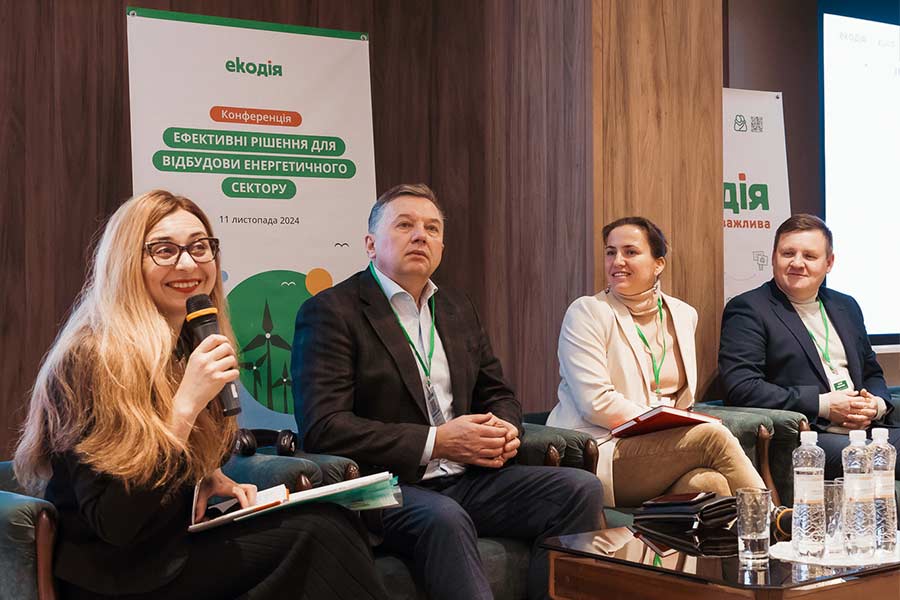On November 11, during the conference “Effective Solutions for the Reconstruction of the Energy Sector” in Kyiv, the idea of creating a system of “energy consultants” in Ukraine was discussed – a proven mechanism that is already effectively operating in Germany, Sweden, the Netherlands, and other countries. Its goal is to increase the efficiency of energy projects in communities and support the country on its path to decentralised generation based on renewable energy sources.
Energy consultants are specialists who can potentially help communities, businesses, and HOAs optimise their energy processes. Specifically, they analyse the condition of facilities, prepare technical specifications, work on feasibility studies, and provide recommendations for improving the energy efficiency of buildings. For example, the owner of a private house can receive detailed recommendations on modernising the heating system, improving thermal insulation, or switching to renewable energy sources.
“Currently, many environmental NGOs are performing tasks that are not part of their core activities, such as creating technical documentation or constructing solar power plants. Ukraine needs a more structured approach to energy projects. Grant funds alone are not enough to bring about large-scale changes in the sector. A system of independent energy consultants is needed to help communities plan and implement such projects,” said Kostiantyn Krynytskyi, head of the energy department at NGO Ecoaction.
Serhii Kondratiuk, Deputy Mayor of Zhytomyr, shared his city’s experience: “In Zhytomyr, we realised that we desperately needed our own power generation. Currently, we have several gas units. We are installing solar panels on the water utility, as well as solar power plants in two hospitals. Such solutions help not only Zhytomyr but also Ukraine to adapt to energy challenges. However, without technical consultants, it is difficult to ensure the successful implementation of such projects. We are introducing European technologies and need experienced specialists to effectively develop an energy-independent infrastructure.”
As was emphasized by Yurii Fomichev, Mayor of Slavutych, the role of the institution of energy consultants should be viewed more broadly than just as technical supervision of construction. They are those who advise on the best course of action in strategic terms. For example, if a community is doing roofing work, a consultant might suggest installing a solar power station at the same time to complete the project comprehensively.
“Unfortunately, it is challenging to find qualified specialists in small communities for many reasons. Some of the staff are currently defending the country on the front lines, and salary expectations vary significantly between municipal enterprises and large energy companies such as Energoatom or nuclear power plants, where salaries start at 45,000 hryvnias. The community can’t offer such conditions to specialists. Therefore, the State Agency for Energy Efficiency and the relevant Ministry should play a key role in supporting energy consultants. If this issue is left at the local government level, it will be extremely difficult to achieve the desired result,” said Yurii Fomichev.
The experience of Germany, where the energy consultant system is already in place, was also discussed during the conference. In this country, these specialists are registered with the German Energy Agency (dena), which receives state support. Consultants undergo specialised training and certification and work on a commercial basis, which allows communities and businesses to choose reliable specialists.
“We need to break out of the vicious circle where russia destroys energy infrastructure and we just replace individual parts. Developing a decentralised energy system could be a solution that is more difficult to destroy and will ensure a sustainable transition to new energy standards. We see that communities are reliable partners in implementing such projects, although our ability to support them is limited. Germany already has a system of energy consultants in place, and we are ready to share our experience with Ukraine,” explained Cyriac Massué, representative of the German Federal Ministry for Economic Affairs and Climate Action, responsible for the German-Ukrainian Energy Partnership.
According to him, Germany already provides financial support for “green” projects in Ukraine, in particular for municipal infrastructure, schools, and hospitals. These projects have proven their effectiveness, but long-term development requires systematic approaches and private investment, as the state budget has limited resources.
The conference served as a platform for sharing experiences on successful solutions for Ukraine’s energy recovery and prospects for creating energy storage systems. Recommendations from Ukrainian civil society organisations on creating a system of energy consultants were also presented. Participants discussed the possibilities of financing these initiatives through donor support, particularly from Germany.
Watch full video of the presentation:
Translated from Ukrainian by Ecoaction volunteer Polina Tsybulska.

